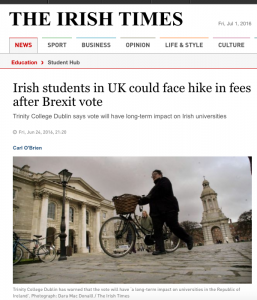“I was told I’d love it here and no account to book a return flight. Of course I didn’t listen and had to cancel it a few weeks later!”
Kimberley Poon, a supply teacher in London with Prospero Teaching, writes about making the big move from Australia to England to teach, and why braving the journey to the other side of the world – despite dubious encouragement from some of her friends – was worth it.
“Wow, you’re going to London!”
“If you can teach in London. you can teach anywhere.”
What would a translation app have made of my colleagues’ good wishes? “You’re crazy! You’ll be eaten alive by British kids.” Thanks, guys!
It was a fair point, though. Why was I leaving Australia straight after graduation to put myself at the mercy of the English education system – something I knew almost nothing about?
My last term at university in Melbourne had been a tough one for personal reasons. And in the education faculty, our heads had been filled with warnings about the near-impossibility of achieving a work-life balance in teaching. Burn-out was the risk, we were repeatedly warned: “Sixty per cent of you won’t make it beyond five years in teaching.”
Encouraging. Not.
I’d dreamed of being teacher since I was 13; it was all I had ever wanted to do. And I just knew that I was a prime candidate for burn-out. I would give it my all because, temperamentally, I didn’t know how not to.
I was in line for two full-time teaching jobs back home but decided half-way through my interviews that the right way into the profession for me was to work part-time as a supply teacher.
I needed to take it gently and start by boosting my confidence so I had more faith in my own abilities before I took the plunge in a full-time post.
By chance, I found a flier for a British-based teacher recruitment agency and got in touch. And I know I simply wouldn’t have come to the UK without Paddy, the recruitment consultant they teamed me up with in London.
I can get pretty anxious and at this point I was still dithering about whether or not it was a good idea to come to Britain.
Eventually, with much encouragement and calming of nerves from Patrick, I decided to come over – for three months. Patrick said I’d love it here and told me on no account to book a return flight. Of course I didn’t listen and had to cancel it a few weeks later!
So here I was in London, faced with the prospect of my first teaching post. I was still not feeling at all confident in my abilities – I had only just finished my teacher training, after all, and my final school placement in my last term hadn’t gone particularly well and had shaken what self-belief I had.
But straight away in London, I was already experiencing a new sense of independence and personal growth. Back home I lived with my family; here I was an adult building a new life in an unfamiliar city.
And I think London schools are incredible. It’s quite a shock being in such a complex culture, with so many accents to get used to. At home, the area I come from is not very diverse, so this is a new – and exciting – experience for me.
“At home, the area I come from is not very diverse, so this is a new – and exciting – experience for me”
And the range of school types in Britain is so different to Australia. I have taught in public schools (which are actually fee-paying and not free at all), free schools (part of the state sector but free of local authority control), academies (similar to free schools) and Church of England schools. It has been so interesting to see all the different ways teachers plan their classes and the approaches they take.
And as I acquired so much new experience in such contrasting types of school in a very short space of time, I began to find my feet.
Gradually, I began to feel I was missing out on the continuity of seeing the kids through the learning process. So for the last half term I’ve been doing a job share at a school where I’ve been doing supply cover for a while. And I’m working the rest of the week, too, in supply roles.
With the teacher over-supply situation at home getting worse, a lot of my friends have still not got jobs whereas here there’s as much work as I want.
Some of my friends in Australia are doing supply teaching. But, unlike me, their work isn’t guaranteed. In London, once I’ve said which days I’m available, the agency finds me work – or pays me off. It’s a win-win situation.
I’ve made life-long friends among other Aussies in London working for the same agency. We hang out together a lot. The agency let five of us take time off together to do a tour of the Baltic and Russia. It was fantastic.
So, having cancelled my flight home, I’ve been in the UK for two years. And I want more of it. I’m now looking for ways to stay on here. Any ideas?

